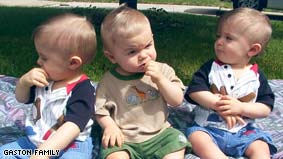Until they were 18 months old, the Gaston triplets seemed like normal, healthy babies.
It remains one of the greatest mysteries of medicine. Although autism will be diagnosed in more than 25,000 U.S. children this year, more than new pediatric cases of AIDS, diabetes and cancer combined, scientists and doctors still know very little about the neurological disorder.
Unlike childhood diabetes or pediatric leukemia, there is no blood test, no scan, no image that can detect autism. Diagnosis relies totally on behavioral observation and screening. And that's not easy.
According to the National Institute of Neurological Disorders and Stroke, three distinctive behaviors characterize autism: lack of social interaction, problems with verbal and nonverbal communication, and repetitive behaviors or narrow, obsessive interests. But children with autism display these symptoms in many different ways, some as mild as avoiding eye contact, while others are totally immersed in a world of their own.
Unlike childhood diabetes or pediatric leukemia, there is no blood test, no scan, no image that can detect autism. Diagnosis relies totally on behavioral observation and screening. And that's not easy.
According to the National Institute of Neurological Disorders and Stroke, three distinctive behaviors characterize autism: lack of social interaction, problems with verbal and nonverbal communication, and repetitive behaviors or narrow, obsessive interests. But children with autism display these symptoms in many different ways, some as mild as avoiding eye contact, while others are totally immersed in a world of their own.
Advertisement
- Top Ranked Global MBARanked #2 in the World by Financial Times. Designed for Top Executives. www.triumemba.org
- Stem Cell Autism TherapyUmbilical cord Stem Cell Treatment for Autism www.StemCellTreatmentNow.com
Dr. Gary Goldstein, president of Kennedy Krieger Institute, one of the leading U.S. facilities for autism research and treatment, says although doctors know more about autism than ever, plenty of questions remain unanswered. Over the past few years, it has become clear that genetics play a big role in the development of autism. But researchers believe something -- a trigger -- sets off autism in a child.
"It's a combination of being genetically vulnerable, and then having some kind of social or toxic exposure that tips you over," Goldstein says. If scientists find that trigger, they could find the missing piece of the autism puzzle.
It's that missing puzzle piece that frustrates families with autistic children. When the Gaston triplets of Ellicott City, Maryland, were born seven years ago, their parents, Lynn and Randy, were thrilled. For years, they had been trying to have children. After in vitro fertilization, Lynn gave birth to identical twins, Hunter and Nicholas, and a fraternal brother named Zachary. Though they were born prematurely, they grew to be healthy, happy babies. Then something changed.
At around 18 months, the boys began to display unusual behaviors. Zach became compulsive, lined up cereal boxes and toys; he wouldn't socialize and kept to himself. Hunter would roam the house at night and scream at the top of his lungs. Nick just stopped talking.
"It's a combination of being genetically vulnerable, and then having some kind of social or toxic exposure that tips you over," Goldstein says. If scientists find that trigger, they could find the missing piece of the autism puzzle.
It's that missing puzzle piece that frustrates families with autistic children. When the Gaston triplets of Ellicott City, Maryland, were born seven years ago, their parents, Lynn and Randy, were thrilled. For years, they had been trying to have children. After in vitro fertilization, Lynn gave birth to identical twins, Hunter and Nicholas, and a fraternal brother named Zachary. Though they were born prematurely, they grew to be healthy, happy babies. Then something changed.
At around 18 months, the boys began to display unusual behaviors. Zach became compulsive, lined up cereal boxes and toys; he wouldn't socialize and kept to himself. Hunter would roam the house at night and scream at the top of his lungs. Nick just stopped talking.


Nenhum comentário:
Postar um comentário